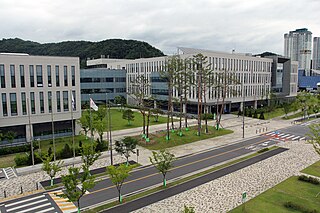Institute for Basic Science
| Korean spelling | |
|---|---|
| Korean alphabet : | 기초 과학 연구원 |
| Hanja : | 基礎 科學 硏 究 院 |
| Revised Romanization : | Gicho Gwahak Yeonguwon |
| McCune-Reischauer : | Kich'o Kwahak Yŏn'guwŏn |
The Institute for Basic Science ( IBS , Korean: 기초 과학 연구원 ) is a government-funded research organization headquartered in Daejeon ( South Korea ). The institute was founded in 2011 by Lee Myung-bak and deals with basic research in science and society, the motto is "Making Discoveries for Humanity & Society".
Working method, equipment
The IBS is headed by a President (in 2019: Doochul Kim) and is subordinate to the Ministry of Science. It runs around 30 research centers in South Korea and employs around 1,800 researchers and doctoral candidates. Some of these research centers are located on campuses of other institutes and universities, e.g. KAIST , DGIST , UNIST , GIST , POSTECH , Seoul National University , Sungkyunkwan University , Korea University , Yonsei University , Ewha Womans University and Pusan National University .
Around 30 percent of the scientists come from abroad.
The IBS has had a Cray XC50 supercomputer called Aleph since 2018 .
The RAON heavy ion accelerator, budgeted at two trillion won (around 1.6 billion euros) , is to be completed by 2021 .
Web links
- Official website (English, Korean)
Individual evidence
- ^ Institute for Basic Science (IBS). In: Nature Index. Retrieved November 9, 2019 .
- ^ Bibiana Campos Seijo: Funding basic science in South Korea. In: Chemical & Engineering News. October 19, 2019, accessed November 9, 2019 .
- ^ Institute for Basic Science (IBS). In: Top 500. Retrieved November 9, 2019 .
- ^ Korean Government to Invest 2 Trillion Won in Heavy Ion Accelerator. In: Business Korea. May 12, 2014, accessed November 9, 2019 .
- ^ Rare Isotope Science Project. In: IBS. Retrieved November 9, 2019 .
Coordinates: 36 ° 22 '35.7 " N , 127 ° 23' 5.4" E

